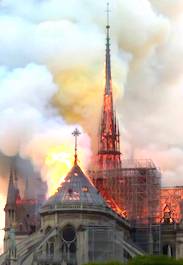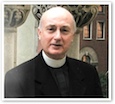On using the brain
- FATHER GEORGE W. RUTLER
Egyptian embalmers assumed that the brain would not be needed in the afterlife, and so they threw it away.
 Since there will be no need for sun or moon in the Heavenly City, for "the Lamb is the lamp thereof" (Rev. 21:23), the "glorified body" may enjoy immediate perception. But God expects us to use our brains in this temporal world. Jesus did not commend the dishonesty of the Unjust Steward (Luke 16:1-12), but he said we should use our minds as justly as the steward did unjustly.
Since there will be no need for sun or moon in the Heavenly City, for "the Lamb is the lamp thereof" (Rev. 21:23), the "glorified body" may enjoy immediate perception. But God expects us to use our brains in this temporal world. Jesus did not commend the dishonesty of the Unjust Steward (Luke 16:1-12), but he said we should use our minds as justly as the steward did unjustly.
The human brain is the most complex machine in the universe, with 86 billion neurons. The Johns Hopkins neurologist Barry Gordon refuted the myth that people on average use only ten percent of the brain's capacity. Although at rest the brain uses just a small fraction of its capacity, even then it is using around twenty percent of the body's energy, while making up only about three percent of the body's weight.
The Catholic faith is not a form of brainlessness. It needs reason to avoid superstition, just as reason needs faith to avoid rationalism. So Pope St. Pius X asserted in his Oath Against Modernism, "to be sworn to by all clergy, . . . religious superiors . . . and professors," that: "…faith is not a blind sentiment of religion welling up from the depths of the subconscious under the impulse of the heart and the motion of a will trained to morality; but faith is a genuine assent of the intellect to truth received by hearing from an external source." The first Bishop of Rome said that Christians must use their brains: "Always be ready to give a defense to everyone who asks you a reason for the hope that is in you" (1 Peter 3:15).
Étienne Gilson wrote: "We are told that it is faith which constructed the cathedrals of the Middle Ages. Without doubt, but faith would have constructed nothing at all if there had not also been architects; and if it is true that the façade of Notre Dame of Paris is a yearning of the soul toward God, that does not prevent its being also a geometrical work. It is necessary to know geometry in order to construct a façade which may be an act of love . . ."
Within a ten-minute walk of our church in these past few days, one man attacked an officer with a meat cleaver, and another man planted two explosives. The first man had shouted Islamic slogans outside a Brooklyn synagogue in July and was declared "not a terrorist threat." The human brain can rationalize unreality if it replaces true faith in God with its own agenda.
In 1899 William Hughes Mearns wrote about a ghost:
Yesterday, upon the stair,
I met a man who wasn't there.
He wasn't there again today,
I wish, I wish he'd go away…
Terrorists are not ghosts and will not go away even if reasonably intelligent people misuse their brains to pretend they are not there.
 This is Meaghen Gonzalez, Editor of CERC. I hope you appreciated this piece. We curate these articles especially for believers like you.
This is Meaghen Gonzalez, Editor of CERC. I hope you appreciated this piece. We curate these articles especially for believers like you.
Please show your appreciation by making a $3 donation. CERC is entirely reader supported.

Acknowledgement
 Father George W. Rutler. "On using the brain." From the Pastor (September 25, 2016).
Father George W. Rutler. "On using the brain." From the Pastor (September 25, 2016).
Reprinted with permission of Father George W. Rutler.
The Author
 Father George W. Rutler is the pastor of St. Michael's church in New York City. He has written many books, including: The Wit and Wisdom of Father George Rutler, The Stories of Hymns, Hints of Heaven: The Parables of Christ and What They Mean for You, Principalities and Powers: Spiritual Combat 1942-1943, Cloud of Witnesses — Dead People I Knew When They Were Alive, Coincidentally: Unserious Reflections on Trivial Connections, A Crisis of Saints: Essays on People and Principles, Brightest and Best, and Adam Danced: The Cross and the Seven Deadly Sins.
Father George W. Rutler is the pastor of St. Michael's church in New York City. He has written many books, including: The Wit and Wisdom of Father George Rutler, The Stories of Hymns, Hints of Heaven: The Parables of Christ and What They Mean for You, Principalities and Powers: Spiritual Combat 1942-1943, Cloud of Witnesses — Dead People I Knew When They Were Alive, Coincidentally: Unserious Reflections on Trivial Connections, A Crisis of Saints: Essays on People and Principles, Brightest and Best, and Adam Danced: The Cross and the Seven Deadly Sins.




